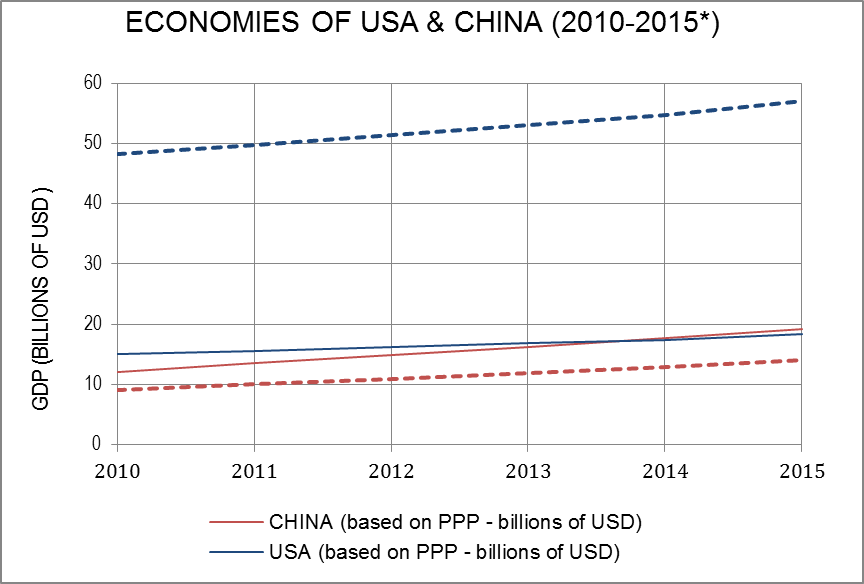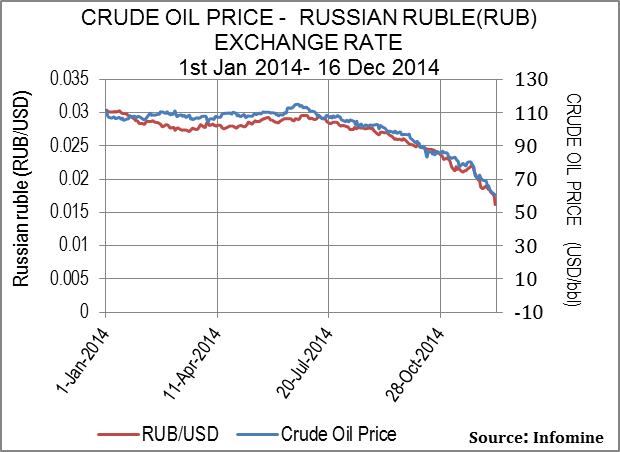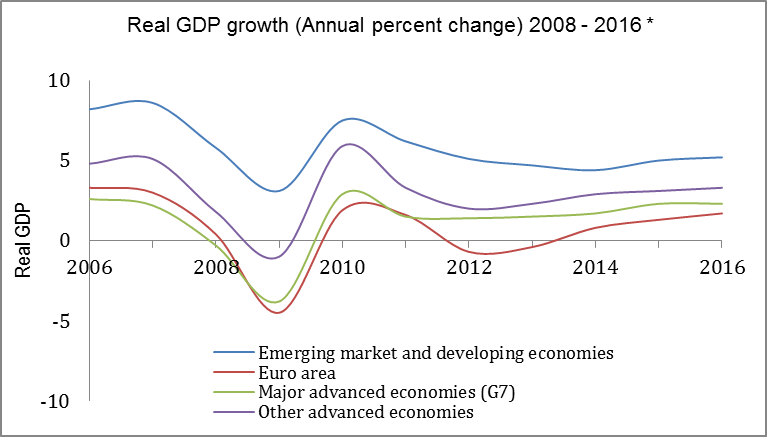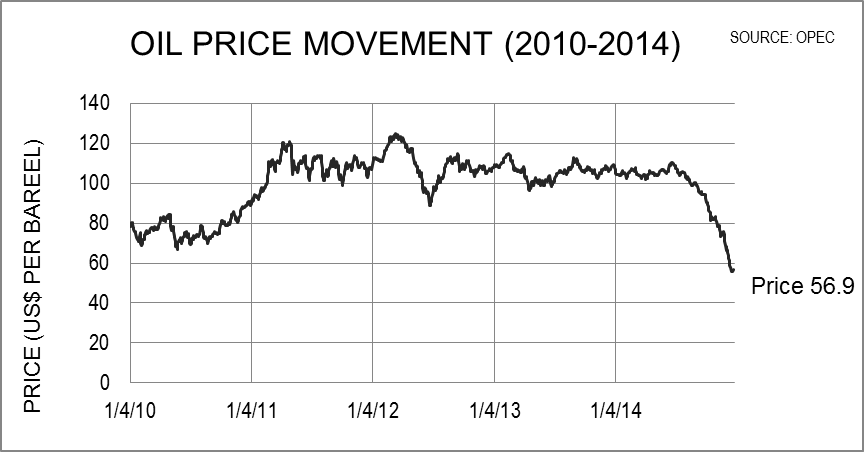World Economy 2014

Please note that we are not authorised to provide any investment advice. The content on this page is for information purposes only.
2014 witnessed slow growth in the world economy. It tested economies of emerging markets and advanced economies. Economies like Eurozone, Japan and Russia saw some major financial shocks. On the other hand, when compared to 2013, advanced countries like USA improved their growth and raised their employment rate. India and China performed better than their counterparts when it came to emerging and developing markets. The last quarter of 2014 saw a lot of market fluctuations and some were big enough to question the strength of the concerned economies.
2014 witnessed slow growth in the world economy. It tested economies of emerging markets and advanced economies. Economies like Eurozone, Japan and Russia saw some major financial shocks. On the other hand, when compared to 2013, advanced countries like USA improved their growth and raised their employment rate. India and China performed better than their counterparts when it came to emerging and developing markets. The last quarter of 2014 saw a lot of market fluctuations and some were big enough to question the strength of the concerned economies. Here is a look at some of the financial news that became highlights in 2014.
Table of Contents
USA’S Economy Gains Momentum
In 2014, USA and China were deeply scrutinized by various economists who looked at GDP as an economic indicator for comparison. But even if China became the largest economy, it still was far from being the world’s richest economy. USA ended its year with sustainable growth, falling unemployment, increased job generation, optimistic markets and low inflation. The upside in the economy was way higher than the risks that weighed America down in 2014.
Source: IMF
Russia’s ‘Perfect Storm’
Russia’s conflict with Ukraine led to Russia getting replaced by Eurozone in G8. The conflict led to sanctions by western economies and hence Russia stopped trading with Eurozone. Russia was Eurozone’s second largest trade partner. Russia’s prime ally in the West was Germany, whose bilateral trade with Russia, stood at $56 billion (8.8 percent of Russia’s total) between January and October 2014. Along with the trade war, Russia is facing a falling ruble. As an economic crisis looms over Russia, markets appear to be in panic. Russian firms have tried to sell rubles to get dollars so as to pay off their foreign currency debts. This further has put a pressure on the ruble. With falling oil prices, Russia’s crisis has deepened. 2014 was marked with high inflation, falling oil prices, devalued ruble, Ukraine conflict and imposed sanctions from the west for Russia. Credit agency, Standard & Poor notified Russia that it could face a downgrade. Any cut from the current BBB- would push Russia’s debt rating into so-called “junk” status and make it extremely expensive for Russia to borrow money abroad.
Emerging Markets Slowdown
Emerging markets usually have a high growth but also carry risks incase of a strong dollar. Brazil had been performing well till 2012 but 2013 onwards, its economy recorded a government debt to GDP of 56.80%.
SOURCE: WORLD ECONOMIC OUTLOOK 2014
*2015 & 2016 IMF Estimates
Since then, Brazil’s economy has been facing slow economic growth, public protests, unnecessary government intervention & inconsistent regulatory measures. The corrupt system and inefficient judiciary has further strengthened the belief that Brazil’s recovery in 2015 is a far cry. 2014 was a narrow escape from recession for Brazil but first quarter of 2015 would decide the success of its regulatory framework. Emerging country like Russia faced troubled times in 2014 and in 2015 its trade partners may feel the results of Russia’s failing economy. Developing country like India has seen a change in its political regime and with the newly elected government; it should see some growth in 2015. However, non- delivery of promised woos may slow growth in this highly inflated country. But as of now India remains a bright spot in Asia. Falling oil prices will be good news for nations that are importers since they may lower inflation.
Fall in Oil Prices
The quarter end of 2014 saw fall in oil prices that shook the world economy. This was good news for importers and bad news for oil driven economies. Exporters lost revenues with the falling prices across the globe and further added tension to already falling economies like Russia & Venezuela. The reason for the drop, according to a BBC report was weak demand in many countries due to dull economic growth, coupled with surging US production and a determination by the oil cartel OPEC that it is not going to prop up prices by cutting production.
Eurozone’s Battle with Recession
Eurozone seemed fatigued with its austerity regime and this year Germany and France showed slow growth. There was a cut in credit ratings by Fitch Ratings for France from AA+ to AA. The company stated that, “The weak outlook for the French economy impairs the prospects for fiscal consolidation and stabilizing the public debt ratio.” A separate survey on investor and analyst confidence from the ZEW Center for European Economic Research gave grounds for optimism about Germany. The European Central Bank’s president, Mario Draghi, and the governing council have already cut interest rates to rock bottom, and the only major tool left at their disposal would appear to be so-called quantitative easing, or bond-buying on a large scale.
Japan’s Troubled Economy
After two and a half years of stagflation, weak domestic demand and heavy debts, Japan had pinned its hopes on ‘Abenomics’ that was to bring fiscal, monetary and structural reforms by the implementation of its three arrows. Mr. Abe postponed the second tax increase until 2017. Investors applauded his renewed focus on growth, sending stocks rebounding after the biggest one-day drop in six months on 17th November 2014. But the failure of Abenomics in 2014 was seen as a worry for many economists across the globe. The central bank was successful in curtailing deflation, which drove prices higher for the first time in nearly two decades. But because wages remained unchanged, and the sales tax pushed prices up further, most Japanese felt poorer and lost confidence. Since Abenomics did not deliver what it promised, it will be difficult to say that it was able to supercharge Japan’s economy. In the same way, since it has addressed some other issues of the economy, terming it a complete failure will be a harsh judgment. Whether Mr. Abe’s magic has evaporated or not will be left for a better judgment in 2015.
2015 will be more like old wine in a new bottle. It will be a year that will test many emerging economies like Brazil, Russia and China. Advanced economies of Japan and Eurozone will take measures to revive the past growths and remain in the race as they hop on the QE bandwagon. USA will show improvement with strict regulatory framework coming into action for big banks.








